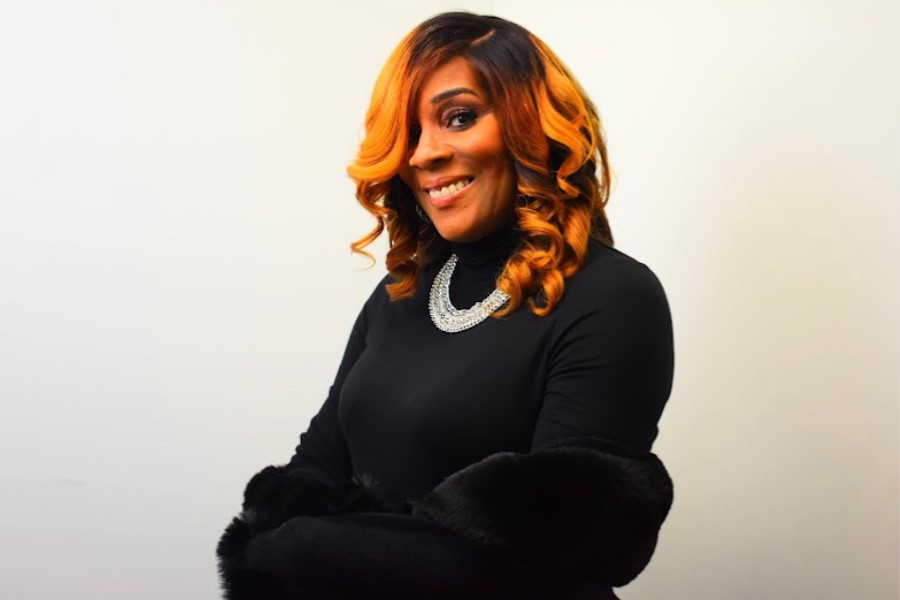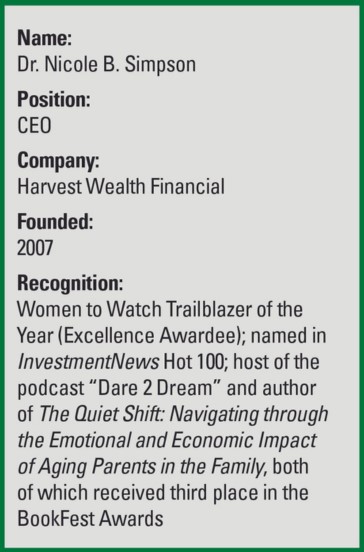

Dr. Nicole B. Simpson, CEO at Harvest Wealth Financial, will never forget where she was on the morning of September 11, 2001.
“That day forever altered the course of my life,” Simpson told InvestmentNews. “On 9/11, I was on the 73rd floor of the World Trade Center – I was in the building when the World Trade Center was attacked.
“When Tower One was hit, I was in Tower Two. The building began to sway back and forth, the lights flicked off and on – I didn’t really understand what was transpiring. None of us did. I walked over to my partner’s window and I remember seeing burning paper – it looked like a ticker-tape parade when the Yankees had won. And I don’t know why that stood out to me, but I felt very anxious to leave.”
After beginning to descend the steps from the 73rd floor, Simpson heard announcements saying that people didn’t have to evacuate. Once she reached the 44th floor, Simpson was about to board the elevator to return to her office when she suddenly decided not to.
Then Tower Two was hit.
“It forever changed my life,” Simpson said. “Because I really went through what we go through when we endure trauma. It was a very traumatic experience that impacted me physically, emotionally, and economically. Having had some diagnosis as a result of 9/11, I was now as this young financial planning practitioner in the position of living what it is that I advise my clients to do. And so, firsthand, I knew the experience of earning six figures and then going down to $18,000 a year while I was sick.”
The road to recovery was a long and arduous one. And while 9/11 was a national tragedy, one that everyone can emotionally connect to, for Simpson her trauma propelled her further into the world of financial planning.
“I had to shift, I had to re-budget, reprioritize, and rebuild what I thought that I had built in the first decade of my career,” she said. “And so this experience, along with what I believe my expertise had been, was very helpful to encourage other individuals. It was about that period of time that I realized how emotionally connected we are to money.”
Combining all these experiences, these realizations – while difficult – was something that supercharged both Simpson’s career and her commitment to helping others through financial trauma.
“When we endure trauma, the first thing is dealing with that experience itself. But what comes thereafter is, how can I manage that catastrophic event or occurrence in my life – whether it be untimely death, whether it be disability, whether it be loss of a vocation or job or income,” she said. “How do I manage that financially? The road to recovery includes all of those things – which is why today I really focus on the fact that while we don’t know what’s going to happen, we want to be prepared as best we can for the unknown and the inevitable.”
While the events of 9/11 were traumatic for Simpson, they also served as a reminder of the importance of integrating personal values and beliefs into her work. This helps empower individuals and communities to understand and manage their finances on a more relatable level.
“After 9/11, one of the things that I recognize is, as a Black woman, I have a responsibility to my culture and community,” she said.
What was most devastating for Simpson that day was the disparity in action plans when it came to different communities.
“It felt like the wealthy had an evacuation plan in place before the world even knew,” Simpson said, noting that some people in downtown Manhattan that day were able to take boats to New Jersey or Staten Island. “When I was in the heart of the World Trade Center, I didn’t have an option or a way out of New York City. Many people that look like me did not find themselves in that position, either.
“And so, I recognized that education was critical for my culture and my community. And I thought that it was important to really make sure individuals knew how invaluable information was – so I started teaching at that point,” she said.
Simpson began teaching in her church, in schools, and even in prisons – teaching people about the power of their gifts and their skills. All this additional work has raised Simpson’s name in the industry, earning her respect from her peers and clients. And she was still doing all this while dealing with the after-effects of 9/11.
“I’m just trying to teach and work and at the same time build a book of business – it can be challenging. And I was still dealing with the recovery from trauma. However, I think that my transparency, authenticity, and my willingness to share the bumps in the road financially and emotionally helped other individuals as well,” she said. “And so while it was a necessary investment, one that I continue to this day, I think everyone has [fared] better as a result of it. Because now we’re more educated and individuals are actually implementing the advice that I started giving so many years ago.”
Looking to the future, Simpson has already been recognized as one of Investopedia’s Top 100 Advisors for 2023 – as well as acknowledged with an honorable mention for a Lifetime Achievement Award with Invest in Others. And she’s dead set on continuing this trajectory of success.
“The way I see things in 2024 is that building a foundation from a financial planner’s perspective is critical for life success,” she said. “It’s not just about the money this year – I believe there’s also dealing with legacy planning and intergenerational wealth. We’re in a period of time now where baby boomers are transitioning resources to Generation X – and it’s impacting our children too.
“I began to recognize a challenge in our culture and community that was dealing with long-term care – the impact that it has on us both economically and emotionally. My agenda moving forward is to continue to talk about the importance of intergenerational wealth and how to ensure that the family stays together emotionally when dealing with the aging parent in the family. How financially all of us can be impacted.”


Relationships are key to our business but advisors are often slow to engage in specific activities designed to foster them.

Whichever path you go down, act now while you're still in control.

Pro-bitcoin professionals, however, say the cryptocurrency has ushered in change.

“LPL has evolved significantly over the last decade and still wants to scale up,” says one industry executive.

Survey findings from the Nationwide Retirement Institute offers pearls of planning wisdom from 60- to 65-year-olds, as well as insights into concerns.
Streamline your outreach with Aidentified's AI-driven solutions
This season’s market volatility: Positioning for rate relief, income growth and the AI rebound
